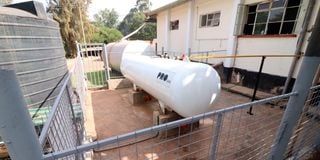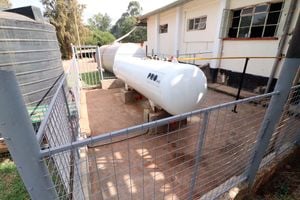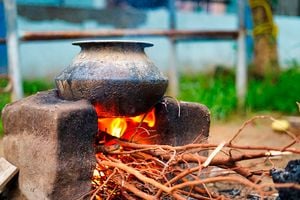
A cooking gas tank at Alliance High School on March 8, 2021.
Success of President William Ruto’s Clean Cooking Gas (CCG) for boarding public institutions project hangs in the balance after its “meagre” allocation was slashed in the recent budget rationalization for the 2024/25 financial year.
The CCG project had an allocation of Sh954.5 million in the current financial year but was reduced by Sh258.3 million in the supplementary budget approved by the National Assembly last week, effectively scaling down the targets from 75 to 50 public learning institutions this year.
The CCG project is among the many flagship initiatives by the Kenya Kwanza administration under the Bottom-Up Economic Transformative Agenda (BETA) agenda. “The effect of the budget cuts hampers the long-term target of connecting 5,000 public boarding schools and learning institutions to the liquid petroleum cas,” the Energy Committee of the National Assembly warns in a report to the House.
The CCG project is key in helping learning institutions transition from biomass fuel to cleaner fuels.
Financing of the project this year will be done through the Petroleum Development Levy (PDL) proceeds “in the meantime with a budget of Sh696.2 million.”
Slashed sums were to fund construction of LPG bullets, cook stoves, and piping in each of the benefiting schools.
In the last financial year, at least Sh2.5 billion was allocated for the project in a bid to make it mandatory for boarding learning public schools to switch to cooking fuel that is eco-friendly.
In February 2023, President Ruto issued a directive that all public boarding schools switch to cooking gas by 2025, which is a year away.
To implement the presidential directive, the National Assembly approved an additional Sh500 million in the 2022/23 financial year towards funding the cooking gas project for the schools.
This is even as the House Energy Committee undertook to amend all relevant laws- the Energy Act of 2019 and the Miscellaneous Fees and Levies Act of 2016 to ensure LPG in schools is a success.
The changes to the Energy Act are aimed at criminalising use of firewood as the mode of cooking in boarding public schools.
The Miscellaneous Fees and Levies Act of 2016 is targeted to convert the anti-adulteration levy imposed at Sh18 per litre of kerosene to boost the LPG supply in the schools.
The anti-adulteration levy was introduced through the 2018 Finance Act following an amendment to the Miscellaneous Fees and Levies Act as a means of checking individuals or companies that mix kerosene with diesel before selling it off to unsuspecting customers.
The amendment recommended increased taxation on Kerosene to the same level as that of diesel to check the mixing of the two products by unscrupulous traders.









